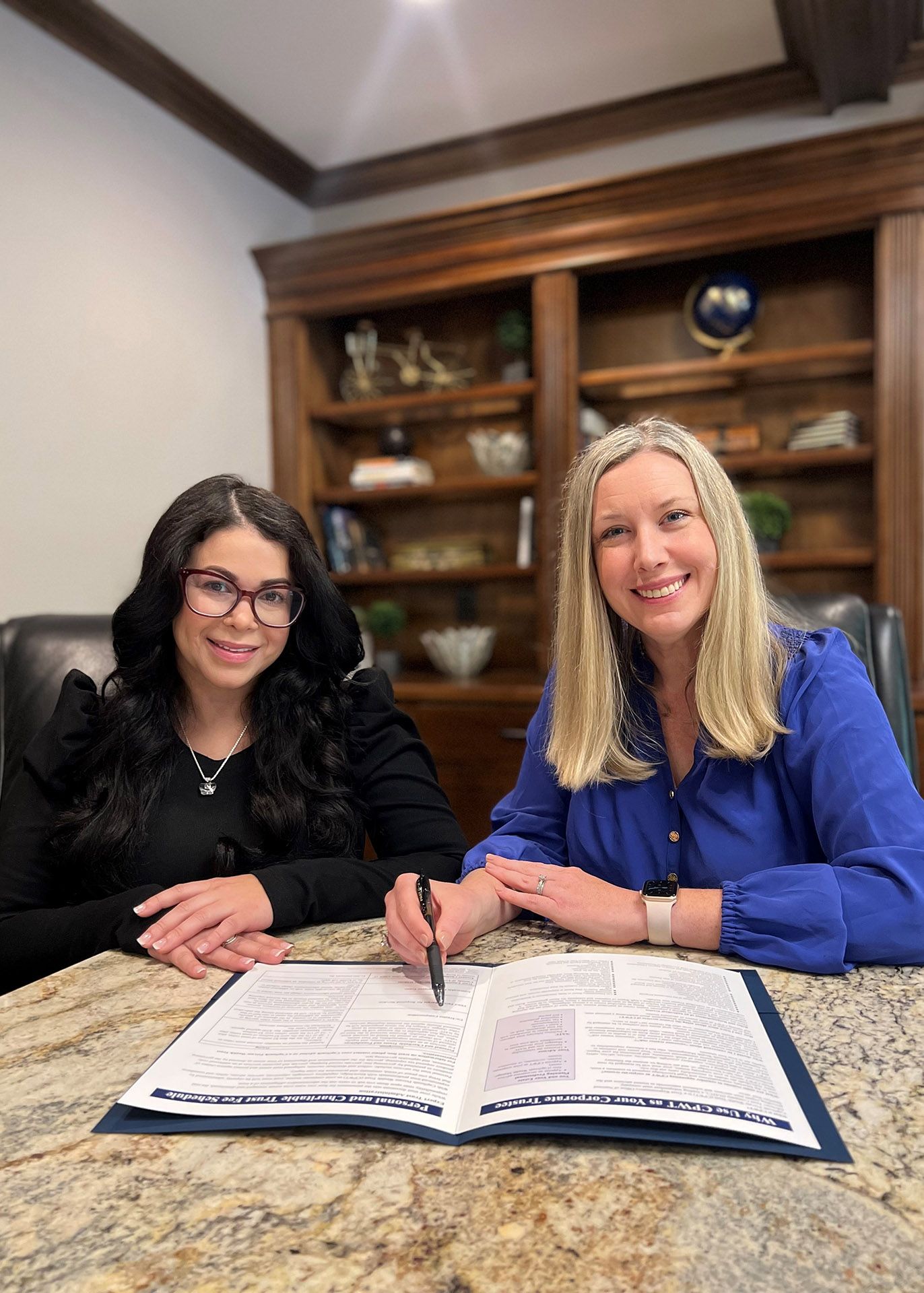New Reporting Requirements – Deadline Approaching Soon
As your trusted financial partners, we are here to share insights that not only keep you informed but also help you feel more connected to the financial world around us…and in some cases help you avoid substantial fines. Recently, the Corporate Transparency Act (CTA) has been making waves, and understanding it can empower you in your business decisions.
What is the Corporate Transparency Act, and Why Are We Having to Do This?
The Corporate Transparency Act, passed in 2021 as part of the National Defense Authorization Act, aims to shine a light on business ownership in the U.S. Think of it as a way to pull back the curtain on who’s really behind companies, especially those that might be used to hide illicit activities. This law requires certain businesses (many businesses/entities) to disclose their beneficial owners — the individuals who ultimately own or control the company. If you own an LLC or small corporation, this likely applies to you. It’s a big step toward fostering transparency and accountability in our economic landscape.
Filings can be done online through the FinCen’s website at fincen.gov/boi, which is actually quite helpful. For entities formed prior to 2024, the deadline to file is January 1st, 2025. Failure to file can result in penalties up to $591 per day. For entities formed in 2024, you are given 90 days from formation. Entities formed after 2024, and any entities making updates after a change in the reported information, will have 30 days after the occurrence to file. It is expected that most companies can file online on their own. Many attorneys are familiarized with the act and filings, and they are available to assist as needed. I do recommend filing soon, so that if you find out that you need help, you can obtain assistance before the deadline.
Why is the CTA Important? – The Reality of Financial Crime
We’ve all heard about the shady dealings that can happen behind the scenes. It’s easy to think these stories are just sensationalized news, but the truth is startling: An estimated $2 trillion to $4 trillion is laundered each year according to the IMF and World Bank! Money laundering and funding criminal activities and terrorism are not just abstract concepts; they have real-world implications that affect everyone.
What is Money Laundering?
Money laundering involves taking funds obtained through illegal methods “dirty money” and “cleaning” them by integrating them into the financial system and making them appear to be legitimate. It is debatable where the term “money laundering” originally came from. Some would attribute it to Al Capone and others’ utilization of laundromats to figuratively launder or clean money gained from illicit activities. Cash businesses such as laundromats are often more susceptible to money laundering due to the difficulty in tracking the transactions. The term may also have begun with the more literal use of actually cleaning old bills. In 1916, it was estimated that it cost $1.30 to print 100 notes but only $0.30 to clean them. Over the years, the term took on the more common interpretation we have now, and certainly by the 1970s and 1980s, it had made its way into common financial jargon.
Let’s take a stroll down memory lane with some notable examples of money laundering:
Al Capone – The infamous mobster wasn’t just about the flashy lifestyle; he was a master at laundering money through bars and gambling operations. His story reminds us that behind every glittering facade, there can be a murky reality.
Wachovia Bank Scandal (2010) – Wachovia, now part of Wells Fargo, was implicated in a scandal involving the laundering of more than $420 billion in drug trafficking proceeds through its accounts and settled the case by paying $160 million. The bank failed to report suspicious activities related to money transfers from currency exchange businesses in Mexico, showcasing significant lapses in compliance that allowed criminal enterprises to exploit the banking system.
HSBC Scandal (2012) – HSBC, one of the world’s largest banks, was fined $1.9 billion for failing to monitor transactions linked to drug cartels in Mexico. Over several years, the bank allowed billions of dollars in suspicious transactions to flow through its accounts without proper scrutiny. It’s a classic example of how large institutions can fail to safeguard against financial misconduct. Since then, however, the bank has worked hard to improve their practices, and the Fed ended enforcement actions against the bank in 2022.
The Panama Papers – This leak exposed how some wealthy individuals have used offshore entities to hide assets and launder money, showing that financial crime knows no boundaries.
Of course, not all cases are this large or make the headlines. Money laundering exploits can exist on smaller scales through fronts such as car washes, property management companies, or even…former professors…
Dr. Bruce Bagley – A former University of Miami professor and known expert and author on crime and corruption was himself convicted of laundering $2.5 million through accounts in his name and in the name of a company he had created.
There is a certain entertainment factor and intrigue to the concept as shown through popular shows in recent years:
Marty Byrde from Ozark: In the hit series Ozark, Marty is a financial planner who gets entangled with a Mexican drug cartel and moves his family to the Ozarks to launder money through various legitimate businesses, including a struggling marina and a casino. While fictional, Marty’s escapades highlight how easily seemingly innocent businesses can be used to mask illicit activities and the importance of vigilance and transparency in financial dealings.
Virgin River: In the popular series Virgin River, even the quaint town is not immune from bad actors. In the show, a sawmill and an RV campground are used for illicit purposes, and even seemingly innocent parties are pulled into the dangerous world of drug trafficking and related money laundering activities. The show hints at the complexities of running businesses in a small town and how easy it can be for individuals to blur the lines between legitimate and illegitimate activities, emphasizing the need for clarity and oversight.
These stories give you an idea of why regulations like the CTA are developed to keep our financial system honest and transparent.
How Financial Institutions Monitor for Anti-Money Laundering
So, how do banks and financial institutions help combat money laundering? Think of them as the gatekeepers of financial integrity:
- Know Your Customer (KYC): This is the first line of defense. Financial institutions get to know their clients by verifying identities and understanding their business activities. It’s a bit like getting to know your neighbor before borrowing a cup of sugar.
- Transaction Monitoring Systems: These systems keep a watchful eye on transactions, flagging anything that looks out of the ordinary. It’s like having a vigilant friend who notices when something feels off.
- Suspicious Activity Reporting (SAR): When something doesn’t sit right, institutions file SARs with the Financial Crimes Enforcement Network (FinCEN). This helps law enforcement dive deeper into suspicious activities.
- Risk Assessment: Institutions regularly assess their risk levels. Understanding where vulnerabilities lie allows them to tailor their monitoring and protect themselves from potential issues.
- Employee Training: Employees are trained to recognize red flags and to know the protocols for reporting suspicious activities.
- Collaboration with Law Enforcement: Financial institutions often work hand in hand with law enforcement, sharing vital information that can lead to effective interventions.
- Regular Audits and Compliance Checks: They conduct audits to ensure compliance with anti-money laundering (AML) regulations. This helps maintain accountability and trust.
We’re all in this together!
The Corporate Transparency Act represents a significant shift in how businesses are regulated in the U.S. By increasing transparency and accountability, it helps combat financial crimes that can undermine the economy and national security. If you operate an LLC or small corporation, it’s vital to stay informed about these changes and ensure that your business complies with the new requirements.
Since this is new legislation, unfortunately word of the requirements seems to be moving slow. Feel free to forward this message to others you know that may be impacted.
As always, we are here to help you navigate these developments. Unfortunately, due to the legal nature of interpreting the legislation and requirements, we can provide limited guidance in the area of the CTA. We recommend reviewing the FinCen website and associated FAQ’s and consulting with your attorney to further determine how the provisions may affect you or your company.
To learn more about CapSouth Wealth Management and how we can help, visit our website at www.capsouthwm.com/what-we-do or contact our office to schedule an appointment with an advisor at (334) 673.8600.
Article by:
Sources:
https://www.mentalfloss.com/article/502449/myth-how-al-capone-gave-us-term-money-laundering
https://www.state.gov/anti-money-laundering-and-countering-the-financing-of-terrorism/
https://fincen.gov/boi
https://www.npr.org/2010/03/18/124807736/wachovia-settles-money-laundering-case
https://www.reuters.com/business/finance/us-fed-terminates-enforcement-action-against-hsbc-2022-09-02/
https://www.barrons.com/news/key-background-on-the-panama-papers-scandal-06242c47
https://www.fbi.gov/history/famous-cases/al-capone
https://www.nytimes.com/2021/11/17/us/bruce-bagley-money-laundering-venezuela.html
CapSouth Partners, Inc, dba CapSouth Wealth Management, is an independent registered Investment Advisory firm. Information provided by sources deemed to be reliable. CapSouth does not guarantee the accuracy or completeness of the information. CapSouth does not offer tax, accounting or legal advice. Consult your tax or legal advisors for all issues that may have tax or legal consequences. This information has been prepared solely for informational purposes, is general in nature and is not intended as specific advice. This article contains external links to third party content (content hosted on sites unaffiliated with CapSouth Partners). CapSouth makes no representations whatsoever regarding any third-party content/sites that may be accessible directly or indirectly from this article. Linking to these third-party sites in no way implies an endorsement or affiliation of any kind between CapSouth and any third party, including legal authorization to use any trademark, trade name, logo, or copyrighted materials belonging to a third-party entity. Some information in this article was produced with the assistance of ChatGPT (October 24 Version); Chat GPT is an artificial intelligence model owned by OpenAI. CapSouth is not affiliated with OpenAI.



